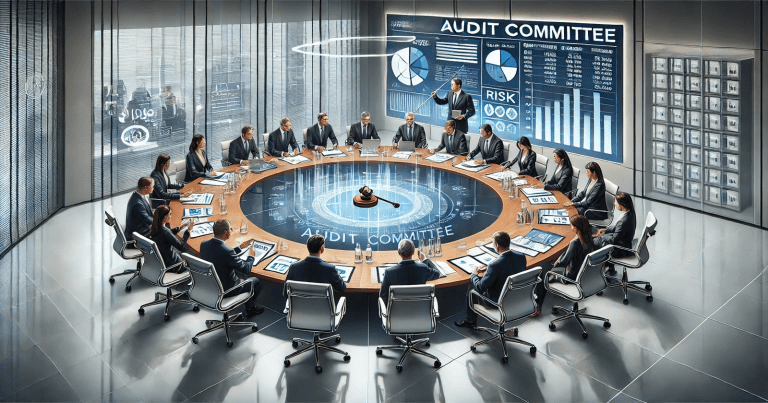An auditing committee responsibilities addresses issues concerning internal and external audits. The audit committee’s responsibilities are essential in rendering transparency and accountability. To every corporate governance issue, they are thus highly relevant to every corporate institution. The audit committee’s ambience for determining outcomes. It comprises financial reporting, legal and regulatory compliance, risk management, and internal controls. It sets the mechanisms through which accountability can be implemented. It is a deterrent to errors and fraud in financial governance. These parameters then serve the interests of all stakeholders. Ensure the company is mandated to operate within the law and ethical standards.
What is Audit Committee in Corporate Governance?
An audit committee safeguards that the organisation follows the requisite financial regulations, regulatory processes, and ethical guidelines. The audit committee is an independent structure. It monitors internal audits, external audits, financial reporting, and compliance with regulations.
The audit committee may comprise independent directors. As a group, have financial, accounting, or auditing knowledge. They ensure that management prepares financial statements that are true and fair under generally accepted accounting principles, ethical practices, and appropriate risk-management approaches.
Audit Committee Responsibilities
Audit committee responsibilities are beyond the financial, compliance, good governance, and fraud prevention. Strong corporate governance depends both on proactive information from audit and charter and on a clear audit committee structure that promotes transparency and accountability. The following outlines the broad duties of audit committees:
Review Financial Reporting
The audit committee reviews financial statements to ensure that they represent an accurate and fair view of the organisation’s financial position. Accounting standards and deviations are checked.
Example: An audit committee reviews the quarterly financial reports of a public company to ascertain conformity with International Financial Reporting Standards (IFRS).
Ensure Organizational Compliance with Regulations
Audit committees consist of members who monitor compliance concerning regulations and investigate the policies and audit procedures. Example: An audit committee will ensure that a healthcare entity complies with the Health Insurance Portability and Accountability Act (HIPAA), which governs the protection of patient information.
Internal Control Evaluation
Good internal controls exist to counteract fraud and inefficiencies in operations. The audit committee evaluates and gives its stance on improving internal control.
Example: A multinational corporation’s audit committee evaluates cybersecurity measures to prevent data breaches.
Management of Risks
The audit committee assess whether or not they are significant for the organisation. Thus, it ensures that the risk management policy aligns with the organisation’s objectives.
For example, The audit committee of the bank reviews the credit risk management framework that will prevent loan defaults from happening.
External Auditors’ Communication
External auditors ensure all financial reports are correct. They are appointed by the audit committee that looks into the findings of the audit and the questions that arise.
For example, An e-commerce company’s audit committee reviews an external auditor’s report on revenue recognition practices.
Functions of the Audit Committee
The functions of an audit committee are to ensure financial governance, risk management, and transparency of an organisation.
- Monitoring of Internal Audits: Internal audits investigate operational efficacy. Regulatory compliance and financial compliance are maintained. The audit committee will ensure that internal auditors remain independent in their evaluations.
- Fraud Investigations and Misconduct: Audit Committees investigate financial fraud, violations of ethical behaviour, and breaches of regulations and take remedial actions to stop such occurrences.
- Approbation of Audit Plans: Audit plans are approved by the audit committee after ensuring they cover all areas of risk and compliance.
- Review of Whistleblower Reports: Those who blow the whistle reveal unethical practices. The audit committee should ensure whistleblower policies protect those employees who report misconduct.
What is the Role of the Audit Committee of a Company?
An audit committee connects management, external auditors, and the board and considers potential risks while examining financial reports and reviewing the internal control system for compliance with financial regulations. Thus, their smooth working adds credibility to firms in the eyes of investors and calls for attention to corporate governance.
Increasing Clarity
An open approach breeds confidence in investors, which is ensured by an audit committee ensuring all these were duly closed and accurate.
Example: The audit committee of an investment firm shuns secrecy in reporting portfolio risks and returns.
Mitigating Financial Risks
Audit committees address financial risks, evaluate them, and take corrective measures to mitigate their effects.
Example: An audit committee of a real estate company observes the market trends. So as to assess risks associated with the valuation of properties.
Enhancing Trust of Stakeholders
Stakeholders are interested in the soundness of the company’s economic assessment. The audit committee ensures that the content of the audited reports reaches industry standards and is made up to its investors’ expectations.
Audit Committee Responsibilities FAQs
1. What is an audit committee in corporate governance?
The corporate governance process would assure financial transparency. It maintains regulation compliance, and accountability.
2. What are the responsibilities of the audit committee?
The audit committee oversees the financial reporting process. It ensures compliance with applicable laws and regulations.
3. Audit committee activities and responsibilities include which of the following?
Audit committee activities and responsibilities cover financial oversight. It reviews internal audits and investigates fraud allegations.
4. What is the role of the audit committee of a company?
The role of a company’s audit committee is to ensure the integrity of financials.
5. What is the function of an audit committee?
The functions of an audit committee are to review financial statements and monitor internal audits. It investigates fraud, approves audit plans, and ensures ethical corporate conduct.


